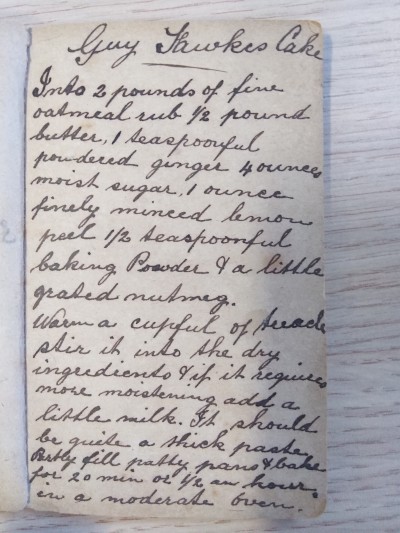Steven Spencer, Director, writes: In 1865, William Booth, a former Methodist minister and his wife, Catherine, an independent evangelist, founded a Christian Mission in east London. In 1878 this mission became ‘The Salvation Army’ and adopted military style uniform for its members and a military terminology renaming its ministers as ‘officers,’ its members as ‘soldiers,’ places of worship as ‘corps’ and William Booth as ‘The General.’ From its London origins, The Salvation Army spread across the whole of the UK by 1880 and had some 1,400 corps by 1890. The corps at Maldon opened in 1887.
This modest diary of 80 pages was written by an (as yet) unidentified member or ‘soldier’ at the Maldon corps (the diary does not identify the corps, but we were able to match the officers mentioned with those appointed to Maldon using contemporary Salvation Army periodicals). The diary is in two small volumes (both lacking covers and the first few pages) and the second volume begins with several pages of recipes, indicating that it probably began life as a recipe book and was only later repurposed as a diary. The entries usually comprise only a single sentence and are separated by gaps of weeks or even months. Little evidence is included about the author’s life beyond a few references to named individuals “coming home” (including Willie, seemingly a member of the armed forces, and Edie, another Salvationist) who may be relations of the author. The most significant reference to the author’s domestic life is the characteristically short entry for 9 November 1900: “Dear Mother Died. Her end was peice [sic]”.
The diary’s entries focus, almost exclusively, on the activities of Maldon corps and predominantly on the number of people ‘saved’ in each meeting. The author seems to have consciously employed a wide variety of expressions for this, including: “three got the victory over the Devil,” “two sinners left their all at Jesus feet,” “one backslider returned to the fold,” “two at the foot of the cross” etc. Notes are made of the regular profits from fundraising efforts including the annual Self Denial collection (when Salvationists give up “some little luxury” for a week and give the money to their corps) and various special events are recorded, which show the Maldon corps’ connection to a wider Salvation Army context, such as the Bicycle Brigade on their evangelical tour of Essex.
Despite its limited content and the dearth of information about its author, this diary is a significant accession. While we hold several diaries written by officers, we have none by a member of a corps. ‘Soldiers’ were often from working class backgrounds and this may partly account for the lack of diaries; indeed the spelling and grammar here may indicate that the author had a limited education or was only used to writing infrequently. We also hold relatively few corps records from as early as the 1890s, so we rely on personal diaries such as this one for a record of the day-to-day activities of a Salvation Army corps.
